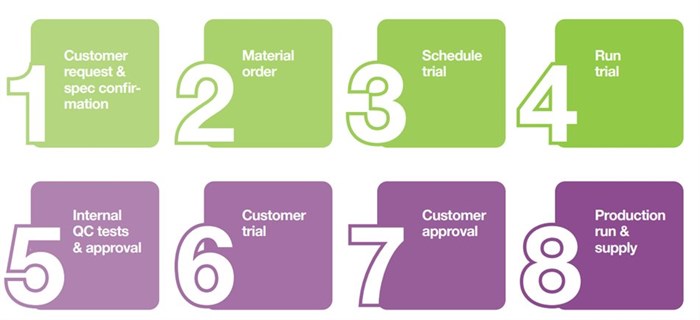Why trials first?
The primary goal of a customer-specific trial production run is to eradicate risk; and to test and optimise the manufacturing process and the tools and materials required for a full production run. Trials also allow for work instructions to be formulated to ensure that communication between production departments are clear, thereby painting an accurate picture of the potential production line challenges that need to be resolved before a full production run is undertaken.
Equally important, a trial production run allows us to maximise meeting your packaging requirements in terms of visual impact (shape and colour, for marketing purposes), production requirements (size and quantity), filling line requirements (body and neck dimensions) and quality requirements (compatibility with content, transport and storage configurations).
By following this multi-perspective approach, we collectively arrive at the juncture where the product is both acceptable to you, our customer, whilst we can also enjoy an optimised and consistent manufacturing process that allows for economies of scale and ultimately favourable pricing and quality.
What issues can the trial process uncover?
Trial production runs can uncover several issues, from tooling problems to quality concerns. It can however yield more than just production insight. When executed with accuracy, it can also give valuable insight along the rest of the product’s journey: filling, capping, transporting, warehousing and retail display.
Whilst we conduct rigorous quality tests, one may find that the content of the packaging is incompatible with, or compromises one of the packaging components. For example, packaging failures can occur due to chemical reactions or unsuitable transport or storage conditions, which may in turn, result in compromised products. The increased use of recyclate may also mean additional testing is required. Such challenges are often unforeseen but can be highlighted and eliminated by continuing the trial process at the customer’s site and throughout the value chain.
The customer benefits
Quite simply stated, the customers’ benefit is to meet the visual, functional, retail and environmental expectations of the packaging item upon the first production run. A multi-discipline approach will ensure that all expectations along the product’s journey is considered, challenges are eliminated and the necessary approvals are obtained in order for both customer and conversion organisations to meet and maintain their accreditation standards.
The ultimate reward
With a renewed focus on brand presence, functionality, food safety and environmentally friendly packaging, one can simply not omit the trial process. It is imperative for trials to continue beyond our manufacturing facilities and not simply be subjected to a customer’s visual inspection. With a thorough ‘conversion to retail’ trial approach, we can collectively deliver an exceptional product to the marketplace.



































